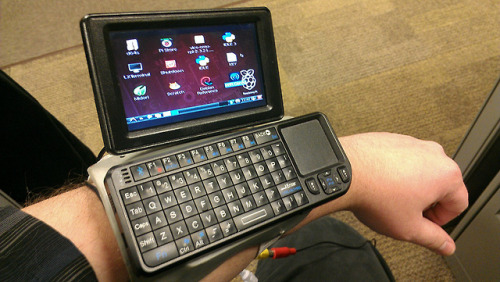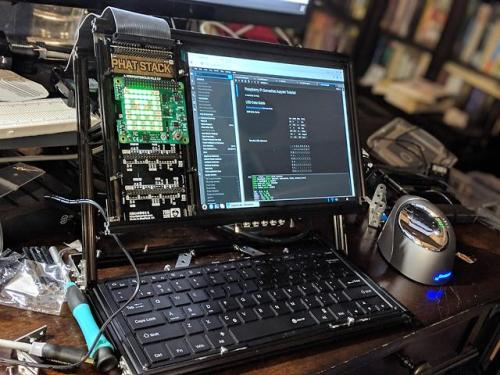Wearable Raspberry Pi By Jason Benson On Flickr, who Is Clearly Living In 3018

Wearable Raspberry Pi by Jason Benson on flickr, who is clearly living in 3018
More Posts from Forward-lang-blog and Others
How to build a horse with programming language 🐎


This guys raspberry pi laptop is goals via Cyberpunk
A controllable prosthetic hand using electromyography to detect the gestures and muscle activities. The project is aimed to be affordable, upgradable, repairable, and flexible. To make it affordable, it consists of 3D printed parts for structure and only common electronic parts are being used. The hand is controlled through EMG signals read by muscle activities on upper forearm. These EMG signals are then transmitted via Bluetooth to Raspberry Pi. The Raspberry Pi then processes these signals and move servo motors accordingly. The project is still in early state with many areas could be improved.
courtesy: Kenneth V.

Scan Select Attack Packet Monitor Clock
Researchers from the University of Tokyo created a “drone dragon” which is able to fly through tight spaces 🐉🐲 | Our audience: #nasa #mavicair #universityofmichigan #djiphantom4 #djiglobal #uav #mavicair #djiinspire1 #quadcopter #spacecamp #drone #robotics #robot #aerialphotography #fpv #drones #skynet #octocopter #djiphantom #arduino #hobbyking #drone #multirotor #dronephotography #sparkfun #tesla #raspberrypi #mavicpro #tokyodisneyland (at University of Tokyo)

The best pull request (PR) in 2017???


The Open Book Project
As a society, we need an open source device for reading. Books are among the most important documents of our culture, yet the most popular and widespread devices we have for reading — the Kobo, the Nook, the Kindle and even the iPad — are closed devices, operating as small moving parts in a set of giant closed platforms whose owners’ interests are not always aligned with readers’.
The Open Book aims to be a simple device that anyone with a soldering iron can build for themselves. The Open Book should be comprehensible: the reader should be able to look at it and understand, at least in broad strokes, how it works. It should be extensible, so that a reader with different needs can write code and add accessories that make the book work for them. It should be global, supporting readers of books in all the languages of the world. Most of all, it should be open, so that anyone can take this design as a starting point and use it to build a better book.
The most important thing I can reiterate in this README is that This Is A Work In Progress! The Open Book board is probably 90% of the way there, but the software required to actually be an eBook is in its infancy; I can put a few Arduino sketches up here, but the long-term goal involves building open source eBook software, and that’s still a ways out.
Read more…
Stop perpetuating the idea that avoiding eye contact = lying. Some of us are just autistic and shouldn't have to force ourselves to make eye contact just to avoid being called liars.
Same goes for fidgeting. It doesn't necessarily mean someone's lying or nervous. It could just be the result of neurodivergence.
Never interrupt a programmer
I don't think other coworkers understand how complicated and stressful it is to explain what's going on in your head when you don't even understand specific problems when coding. Hence, I don't want anyone to disrupt me. Same thought in comic format:

Do you agree? Let me know in the comments below.
Credit
-
 umbral-mage liked this · 2 years ago
umbral-mage liked this · 2 years ago -
 nexux-point liked this · 2 years ago
nexux-point liked this · 2 years ago -
 writtenweaponry liked this · 2 years ago
writtenweaponry liked this · 2 years ago -
 mrbalaclava liked this · 3 years ago
mrbalaclava liked this · 3 years ago -
 forward-lang-blog reblogged this · 3 years ago
forward-lang-blog reblogged this · 3 years ago -
 forward-lang-blog liked this · 3 years ago
forward-lang-blog liked this · 3 years ago -
 werevampiwolf liked this · 3 years ago
werevampiwolf liked this · 3 years ago -
 willfilmsinc liked this · 3 years ago
willfilmsinc liked this · 3 years ago -
 2000threemoved reblogged this · 3 years ago
2000threemoved reblogged this · 3 years ago -
 kore-bc reblogged this · 3 years ago
kore-bc reblogged this · 3 years ago -
 jpegm4fia liked this · 4 years ago
jpegm4fia liked this · 4 years ago -
 blasedior liked this · 4 years ago
blasedior liked this · 4 years ago -
 slinkyslurps-blog liked this · 4 years ago
slinkyslurps-blog liked this · 4 years ago -
 memekyuutie liked this · 4 years ago
memekyuutie liked this · 4 years ago -
 koopstaknicca liked this · 4 years ago
koopstaknicca liked this · 4 years ago -
 rabidrockhound97 liked this · 4 years ago
rabidrockhound97 liked this · 4 years ago -
 thecartonizer reblogged this · 4 years ago
thecartonizer reblogged this · 4 years ago -
 thecartonizer liked this · 4 years ago
thecartonizer liked this · 4 years ago -
 eptouche reblogged this · 4 years ago
eptouche reblogged this · 4 years ago -
 shadowofthewaxwingslain liked this · 4 years ago
shadowofthewaxwingslain liked this · 4 years ago -
 lostpb00 reblogged this · 4 years ago
lostpb00 reblogged this · 4 years ago -
 lostpb00 liked this · 4 years ago
lostpb00 liked this · 4 years ago -
 danieledechereau liked this · 4 years ago
danieledechereau liked this · 4 years ago -
 justapersonwithsomedistractions liked this · 4 years ago
justapersonwithsomedistractions liked this · 4 years ago -
 marsupiums liked this · 4 years ago
marsupiums liked this · 4 years ago -
 psyrinn liked this · 4 years ago
psyrinn liked this · 4 years ago -
 eatle reblogged this · 4 years ago
eatle reblogged this · 4 years ago -
 theystolemyavatar reblogged this · 4 years ago
theystolemyavatar reblogged this · 4 years ago -
 theystolemyavatar liked this · 4 years ago
theystolemyavatar liked this · 4 years ago -
 shadow-of-the-rain reblogged this · 4 years ago
shadow-of-the-rain reblogged this · 4 years ago -
 electronicninja9 liked this · 4 years ago
electronicninja9 liked this · 4 years ago -
 dr3amlush-blog liked this · 4 years ago
dr3amlush-blog liked this · 4 years ago -
 justanotherblonde23 liked this · 4 years ago
justanotherblonde23 liked this · 4 years ago -
 foreigndeflower liked this · 4 years ago
foreigndeflower liked this · 4 years ago -
 cybertane liked this · 4 years ago
cybertane liked this · 4 years ago -
 tunafishgirl liked this · 4 years ago
tunafishgirl liked this · 4 years ago -
 piningmarten liked this · 4 years ago
piningmarten liked this · 4 years ago -
 khaosindigo liked this · 4 years ago
khaosindigo liked this · 4 years ago -
 andrstormwind liked this · 4 years ago
andrstormwind liked this · 4 years ago -
 basilsm liked this · 4 years ago
basilsm liked this · 4 years ago -
 superdarwinnovaism liked this · 4 years ago
superdarwinnovaism liked this · 4 years ago -
 fabioarturoblog reblogged this · 4 years ago
fabioarturoblog reblogged this · 4 years ago -
 fabioarturoblog liked this · 4 years ago
fabioarturoblog liked this · 4 years ago

28 posts